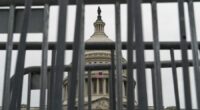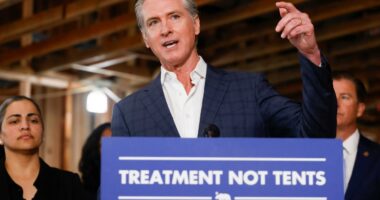Share this @internewscast.com

The first government shutdown since 2019 has begun, and Republican leaders say they won’t discuss extending the COVID-era boosted subsidies for ObamaCare plans until at least mid-November.
Senate Majority Leader John Thune (R-S.D.) stated on Tuesday, “We refuse to be taken hostage over more than $1 trillion in new spending on a continuing resolution.”
However, insurance specialists warn that if Republicans prevail, numerous individuals purchasing health insurance through the Affordable Care Act platforms will encounter increased premiums.
The enhanced tax credits established during the pandemic to assist with insurance costs are set to expire by the end of the year if no action is taken soon. Democrats are pushing for a permanent extension in exchange for their support on a temporary continuing resolution to keep government operations running.
Many Republicans seem content with letting the enhanced subsidies end, but party leaders acknowledge a political backlash is possible. They’ve shown some openness to discussions but insist the extension won’t be included in immediate legislation. They’re also disinterested in a permanent extension, which the Congressional Budget Office estimates would cost $358 billion over the next decade.
“We are open to discussing some issues they are interested in, such as reforming and extending premium tax credits. We’re willing to have that conversation. But right now, this amounts to hijacking the American people,” Thune remarked on Monday.
While Republicans want to wait, experts and leaders of state-based health insurance marketplaces say an extension realistically needs to pass by Nov. 1, when open enrollment for people with plans on the Affordable Care Act’s (ACA) marketplaces begins.
If Congress waits until the end of the year, most Healthcare.gov customers will have already selected plans. That risks people getting sticker shock and deciding to drop their coverage.
Almost everyone who is enrolled in a plan on the ACA exchange is receiving a subsidy. More than 24 million Americans are enrolled in the insurance marketplace this year, and about 90 percent — more than 22 million people — are receiving enhanced subsidies.
The extra marketplace subsidies saved the average customer $705 dollars annually on their premium, according to KFF, a nonpartisan health policy research organization. If they were to expire, premiums for subsidized enrollees would more than double.
“Once people start seeing premiums that they cannot afford, that are not within reach, a lot of those people will turn away. They will decide to either drop coverage if they already have it, or people who are intending to sign up will not do so,” said Audrey Morse Gasteier, executive director of the Massachusetts Health Connector.
According to a CBO analysis, about 4 million people will drop out of ACA plans in the first year after the extra subsidies are discontinued. Those people are likely to be relatively young and healthy, leaving a pool of sicker, more expensive patients — leading to even higher premiums in subsequent years.
Even if the tax credit is extended after Nov. 1 but before they expire, some consumers may never return. Once those people decide to drop coverage because they see a much higher premium than expected, it’s difficult to get them to sign back up if something changes.
“If something comes through late in the game, marketplaces will do everything they can to turn on a dime” and try to communicate with consumers that they will have subsidized plans, Morse Gasteier said. “But it will be yeoman’s work to go back and try to find those consumers that might have been scared away.”
Cynthia Cox, a vice president at KFF and director of the Program on the ACA, said if the tax credits are extended in the middle of open enrollment, the administration could decide to extend open enrollment or open a special enrollment period for people to sign up using the newly extended tax credits.
But with an administration that is openly hostile to the health law, most see that as unlikely. In fact, the Trump administration earlier this year proposed ending the 2025 open enrollment a month early, on Dec. 15, before eventually pushing back the new policy to 2026.
Democrats have been talking about the expiration of the enhanced subsidies for months, and pushed to get them extended as part of the GOP’s massive tax cut bill. That didn’t happen, and now lawmakers are facing a tight deadline of their own making.
“The thing that is regrettable about it is they had lots of time discuss this. They could have discussed this at any point in the past year,” said Leighton Ku, a health policy professor and director of the Center for Health Policy Research at George Washington University.
“Republicans took the effort to extend the 2017 tax cuts … they could have put the same sort of thought and attention to extending the Obamacare subsidies. They chose not to.”
















